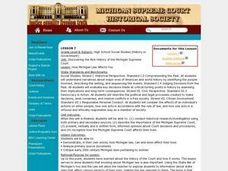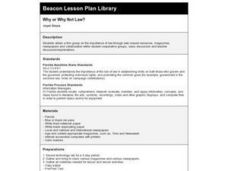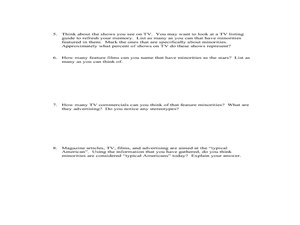School Improvement in Maryland
Analysis of Marbury v. Madison
Should the United States Supreme Court have the power of judicial review? Instructors guide class members through a review of Marbury v. Madison and assist class members in writing a brief of the case. As independent practice,...
Pacific University Oregon
Civil Rights: US History
To gain an understanding of the Civil Rights Movement of the 1960s, class members investigate the Jim Crow Laws, the Emancipation Proclamation, the 13th, 14th, and 15th Amendments of the US Constitution, and the 1898 Supreme Court case,...
State Bar of Texas
Hernandez v. Texas
What if the jury is not made up of people from your ethnicity or background—are they still considered your peers? Scholars analyze the impact the Supreme Court case Hernandez v. Texas had on jury selection across the nation. Paired...
State Bar of Texas
Dred Scott v. Sandford
Who decides someone is not a real person? Scholars investigate the Dred Scott v. Sandford court case which deals directly with slavery and citizenship. After viewing a short video clip, classmates work in pairs to assess and discuss the...
Federal Judicial Center
Amistad and Dred Scott—a Comparative Activity
What do slaves fighting for their freedom on board a ship and a slave fighting for his freedom in a courtroom have in common? Budding historians investigate the two different cases of the Amistad slave revolt and the Dred Scott argument....
Judicial Learning Center
Types of Court Cases
How can one court acquit someone of a crime, while another convicts the person of the same one? It's all because of the differences between civil and criminal trials. An informative resource provides scholars in the field of criminology...
Center for Civic Education
Orb and Effy Learn About Authority
Simplify the teaching of the US Constitution with this primary grade social studies lesson. While reading a fun story about an imaginary place called Bubble Land, children learn about the concept of authority and the importance of...
Judicial Learning Center
The Constitution
Supreme Court justices debate the meaning of the US Constitution, but we expect teachers to explain it to scholars with far less training and experience. A daunting task for sure, but it's not insurmountable with resources that simplify...
Curated OER
The ADA, the Supreme Court, and Self-Advocacy
Students study the role the Supreme Court plays in laws and decisions that affect individuals with disabilities and examine the policies of the American with Disabilities Act. They draw parallels between policies enacted by the ADA and...
Curated OER
How Michigan Law Affects You
Learners examine how the laws in Michigan affect their lives. They use primary source documents to analyze the state's history. They discuss laws pertaining to women as well.
Curated OER
History of Supreme Court
Students study the role of the U.S. Supreme Court in U.S. history. They explore current events about the U.S. Constitution and discuss the Marbury v. Madison case from 1803. They identify the term "judicial review" and judicial...
Curated OER
What Do You Know? Supreme Court Nominations
Students discuss what they believe Supreme Court Justices should do while in office. As a class, they brainstorm a list of their prior knowledge about the justices and Supreme Court. In their journal, they write about the qualities of...
Administrative Office of the US Courts
Elonis v. U.S.
With the explosion of social media sites, with online threats and cyber bullying, issues of freedom of speech have taken on a whole new aspect. Elonis v. U.S. represents the first time the Supreme Court has considered whether or not...
Curated OER
Minorities in Mainstream American Society
So many people fought for Civil Rights in the United States. Read about the Civil Rights Act of 1964, and discuss what the act guarantees. Then pass out a slew of magazines and encourage them to observe how often minorities appear in...
State Bar of Texas
Worcester v. Georgia
Can the president of the United States defy the rulings of the Supreme Court? Students investigate the case of Worcester v. Georgia and the impact it had on society and, most importantly, Native Americans. Using a short video clip as...
Constitutional Rights Foundation
Purged From the Voter Rolls: Husted v. A. Philip Randolph Institute
Once a registered voter isn't always a registered voter. Academics explore the topic of voter registration and hindrances to remaining registered. The resource focuses on data analysis, federal voter registration law, and Supreme Court...
EngageNY
Studying Conflicting Interpretations: Perspectives on Plessy v. Ferguson: Part 2
The Plessy v. Ferguson case was influential in establishing segregation in the United States. Scholars continue reading the court's decision in the case, seeking to understand the key reasons the court came to its decision. Pupils also...
Judicial Branch of California
Fayette v. Take Two: The First Amendment
An informative instructional activity provides scholars the opportunity to study a Supreme Court case regarding the First Amendment and make a ruling with the members of their group. Class members also participate in group discussion and...
Teaching Tolerance
Using Photographs to Teach Social Justice | Confronting Unjust Practices
A powerful photograph of the Freedom Riders of 1961 launches an examination of the de jure and de facto injustices that the civil rights movement of the 1950s and 1960s addressed. Young historians first watch a video and read the Supreme...
EngageNY
Studying Conflicting Interpretations: Perspectives on Plessy v. Ferguson: Part 3
Scholars closely read Justice John Marshall Harlan's dissenting opinion in the Plessy v. Ferguson case, seeking to understand why he disagreed with the court's decision that racial segregation laws for public spaces were constitutional....
Queen's University
The African-American Civil Rights Movement
Every once in awhile a resource comes along that has all the materials you could ever want on a specific topic. Here's such a resource; an amazing collection of primary sources, photographs, posters, handbills, articles, and even the...
Heritage Foundation
Procedural Rights: Amendments VI, VII, and VIII
Even in court, your class members have procedural rights provided by the amendments. Teach high schoolers this important lesson by using the 18th installment of a 20-part unit exploring the US Constitution. The resource provides several...
Curated OER
The Constitution.
Second graders study the Constitution. They examine the meaning and fundamentals of the Preamble of The Constitution of USA. They assess the importance of having a Supreme Law that states the rights and obligations of the citizens. They...

























